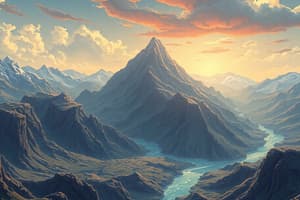Podcast
Questions and Answers
What happens when stress builds at faults? (Check all that apply)
What happens when stress builds at faults? (Check all that apply)
- Energy may be released (correct)
- Rock can bend and break (correct)
- Forces affect Earth's rocks (correct)
- All of the above
What does each star on the map represent?
What does each star on the map represent?
a seismograph
How do geologists use data from seismographs to learn about earthquakes?
How do geologists use data from seismographs to learn about earthquakes?
They often compare information from all over the world.
Which statements describe the moment magnitude scale? (Check all that apply)
Which statements describe the moment magnitude scale? (Check all that apply)
Which factors are involved in earthquake formation? (Check all that apply)
Which factors are involved in earthquake formation? (Check all that apply)
How are S waves and P waves similar? (Check all that apply)
How are S waves and P waves similar? (Check all that apply)
Which statements describe P waves? (Check all that apply)
Which statements describe P waves? (Check all that apply)
Which statements describe surface waves? (Check all that apply)
Which statements describe surface waves? (Check all that apply)
Which phrases describe an earthquake's epicenter? (Check all that apply)
Which phrases describe an earthquake's epicenter? (Check all that apply)
Which statements describe a seismograph? (Check all that apply)
Which statements describe a seismograph? (Check all that apply)
Which statements describe the Richter scale? (Check all that apply)
Which statements describe the Richter scale? (Check all that apply)
Flashcards are hidden until you start studying
Study Notes
Earthquake Dynamics
- Stress accumulation at faults can lead to energy release, rock bending, and breaking, demonstrating the interaction of forces affecting Earth's rocks.
- Key factors in earthquake formation include the movement of tectonic plates, breaking of rocks, and subsurface movement.
Earthquake Location and Measurement
- Seismographs are utilized to determine an earthquake's epicenter, with stars on maps representing these measurement devices.
- Geologists analyze seismic data globally to understand earthquakes more comprehensively.
Seismic Wave Characteristics
- The moment magnitude scale measures earthquake size, collecting data from a seismograph and estimating the total energy released, including different types of seismic waves.
- S waves and P waves are similar as they both shake the ground, travel through solids, and can convert into surface waves.
- P waves, known as primary waves, are unique as they can travel through both solids and liquids.
- Surface waves, produced by P and S waves, travel slower than P waves and result in significant ground motion.
Epicenter and Seismograph Insights
- An earthquake's epicenter is defined as the area at Earth's surface, positioned directly above the focus, at a depth of approximately 100 kilometers.
- Seismographs feature a curved graphing surface, measuring seismic wave activity with a needle on graph paper, and help identify the arrival time of P waves.
Richter Scale Analysis
- The Richter scale assesses fault movement during earthquakes, indicating increasing magnitude alongside damage levels and determining earthquake magnitude based on seismic wave sizes.
Studying That Suits You
Use AI to generate personalized quizzes and flashcards to suit your learning preferences.




